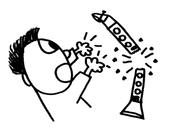Go to Stephen Estep's Xingtone store to download your free ringtone, which is a 30-second excerpt from the third movement, Eleventh Hour. Check the box next to "Get Tone" and click Add to Cart. Fill out the necessary information to get the ringtone sent to your phone. Begin raising the eyebrows of those around you with awesome music today.
Stephen Estep: Technical Difficulties
Sonata for solo clarinet in A and piano (2000)
Movements:
I. Fugitive Televisions
II. Angel Band
III. Eleventh Hour
Performers: Patrick Hanudel, clarinet; Stephen Estep, piano.
Purchase the score: I'm in the process of finishing the score to my clarinet sonata. If you want the sheet music, you can email me at [email protected]; remove STOP and SPAM from the address, of course. I'm working on a few other projects at the moment, but I hope to have the clarinet sonata completely finished by July or August. I will be able to email printable PDF files, and I will have printed scores available also. The price for PDF files will be $10, and $20 (which will include postage in the US and Canada) for the printed score. The clarinet part will come with it, of course.
Movements: I. Fugitive Televisions (Formerly known as "Sarcasm") is named as a parody of and homage to Prokofiev's Fugitive Visions, op 22. The melody began life as a Theme and Variations project for sophomore music theory at Cedarville University. When I went to Miami University, I developed the theme into the first movement of a piano sonata and played it on a composition recital. The next year, I realized it needed more notes than one person could comfortably play, so I converted it to its present form. There is a quote from the Superman theme, which is a result of marker fumes, Mountain Dew and no sleep. Yeah, it's more Prokofiev-sounding than I want, and it verges on tackiness, but I think any faults are redeemed by the ending.II. Angel Band. This was the last movement to be written. Patrick Hanudel and I were to play the second and third movements for the offertory and postlude at the local Episcopal church's Sunday service in April or May of 2000. I knew I wanted to base the slow movement on a hymn, but I didn't know which one. The day before we were to play the movements, I was driving back to Oxford and listening to Emmylou Harris's gospel album, Angel Band, and I realized that Angel Band was the tune I wanted to use. I got back to Oxford around 1 PM, wrote the entire second movement and Patrick and I rehearsed it at 4 PM. I don't recommend that method normally. I used the descending minor 6th in the bass a lot because I was infatuated with how it was used on Marta Sebestyen's album "Apocrypha."
III. Eleventh Hour. This is usually when I get things done. Ever since I started listening to Eastern European folk music in my early teens, I have been fascinated with odd time signatures. The Eastwind album by Andy Irvine and Davy Spillane (which also features Marta Sebestyen) was the biggest influence on this movement. They melded jazz and folk music into one of the best CD's I've ever heard. When I told my composition teacher, C. James Sheppard, about my idea for the movement, he recommended getting Electric Bath by the Don Ellis Orchestra . I had the movement done before I bought the CD, but it's still recommended for its mixture of jazz, Eastern rhythms, and electronics. Performance background: I'm too lazy to go up to my room and dig out the programs to verify dates, but the first and third movements were premiered at my lecture/composition recital at Miami University in April, 2000. The second was premiered (and the third played also) during a Sunday service at Holy Trinity Episcopal Church, Oxford, Ohio, May 7, 2000. Patrick and I were sitting in the green room (for lack of a proper term) before the service, still wondering if we should play the third movement for a postlude. That church has a few excellent concert programs, but we thought it might be a bit much for a normal church service; then we heard the reverend mention that he always wanted to perform Duke Ellington's Jazz Mass for a service sometimes. Patrick and I looked at each other and said, "We're gonna rock this place." The audience loved it, and stayed in their seats for the entire postlude and gave us a standing ovation. The whole piece was premiered at Patrick's Master's recital at Rice University, Houston, Texas, February 3, 2001. He went on to be the principal clarinetist for an orchestra in the southwest, and is now at the Cincinnati Conservatory of Music finishing his degree. I've talked to him about performing the piece again, so we'll see what happens.
